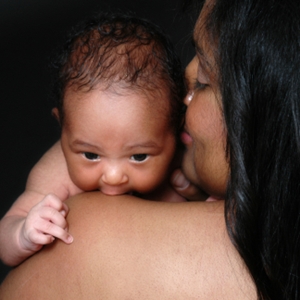
Sometimes, however, these unhappy feelings become so intense that you feel overwhelmed and out of control. If this happens, you may be suffering from Post Natal Depression (PND) and Anxiety.
We can picture unhappy feelings after the birth of a baby on a scale ranging from "blues" on the one hand, PND in the middle, to psychosis in extreme cases.
"The Blues"
Up to 80 percent of new mothers have "the blues" shortly after birth. For a few days, you may feel anxious, tearful, tired and irritable.
Post Natal Psychosis
At the other end of the spectrum, the "deepest blue", is a rare and very serious disorder called Post Natal Psychosis, which affects one or two mothers per thousand.
The mother's thinking becomes seriously disturbed, and she needs immediate hospitalisation and treatment because she is a danger to herself and those around her.
Post Natal Depression and Anxiety
Between 10 and 30 percent of all mothers, in all circumstances, suffer from the middle-range depression. Unlike the other disorders, PND is less easy to identify and may develop slowly any time during the first year of the baby's life.
Every mother is different and may have different combinations of symptoms. A mother may be more anxious or irritable than sad. It may be quite mild or very severe. Often mothers are afraid that they are "going mad". Sometimes a mother has been depressed ever since her pregnancy and sometimes "the blues" don't go away. At times a mother seems to manage well for a while, and then her mood becomes darker and darker.
What causes PND?
There is no single cause of Post Natal Depression. Contrary to what many people believe, PND is not "just hormonal", because fathers and adoptive mothers can suffer from it too. It is our belief that a combination of factors contribute to the condition, such as:
- being a perfectionist,
- lack of support,
- a traumatic birth,
- financial and other stress,
- loneliness,
- an unsatisfactory relationship with the baby's father
- a previous history of depression.
A woman is vulnerable when she has recently given birth and the combination of too many stress factors at this time causes some women to develop PND.
Does this sound familiar?
- "I'm so irritable and confused …"
- "I feel like crying for no apparent reason …"
- "I feel exhausted all the time …"
- "I feel helpless, inadequate and unable to cope …"
- "I worry all the time about the baby …"
- "I feel scared and panicky at times …"
- "I feel ashamed and guilty …"
- "I don't know who I am any more …"
- "I have no interest in anything …"
- "I can't sleep the way I used to …"
- "I don't eat the way I used to …"
- "I don't have any feelings for the baby …"
- "I don't want sex any more …"
- "I sometimes think of hurting the baby or myself …"
If this sounds familiar, you may be suffering from Post Natal Depression and Anxiety.
Treatment of PND
The Post Natal Depression Support Association recommends three things in the treatment of PND: medication, psychotherapy and individual or group support.
Anti-depressant medication can help to control the symptoms. Psychotherapy is expensive but helpful in addressing the underlying psychological and relationship difficulties. Being with other women who really understand how you feel is a great help.
What helps when you are feeling depressed?
- Don't be fobbed off with others telling you to "pull yourself together" or "you should be grateful …"
- Speak to someone - your clinic sister or doctor, a post natal support telephone network
- Speak to your partner or close friend
- Accept that this is not your fault
- Ask for help from others
- Don't allow yourself to get exhausted
- Plan for enough rest and time off
- Prioritise and drop your standards. You can't do as much as you used to around the home
- Join a support group where you can share this experience with others who understand how you feel
- Take one step at a time
For more info visit the Post Natal Depression Support Association's website.
Post a question to Cybershrink.




 Publications
Publications
 Partners
Partners













